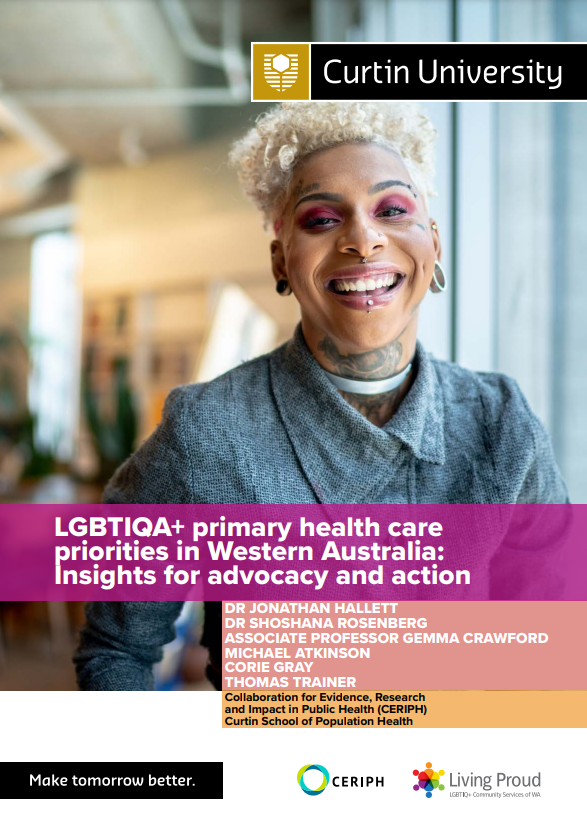A recent report from Curtin University’s Collaboration for Evidence Research and Impact in Public Health (CERIPH), commissioned by Living Proud and funded by WA Primary Health Alliance (WAPHA), reveals significant health care access challenges for LGBTIQA+ people in Western Australia (WA).
Led by Dr Jonathan Hallett from CERIPH, and consulting over 120 stakeholders, the study demonstrates many LGBTIQA+ people continue to face discrimination and experience stigma and exclusion when accessing health care. This is despite being identified as a priority population in various state and national strategies.
exclusion when accessing health care. This is despite being identified as a priority population in various state and national strategies.
The study highlights that while LGBTIQA+ community-controlled organisations play a crucial role in providing essential services and demonstrate utility in supporting health outcomes for LGBTIQA+ people, the sector is primarily volunteer-driven, with scarce infrastructure to support operations.
WAPHA CEO, Learne Durrington, said that while a strengthened community-controlled sector is welcomed, the reality is most LGBTIQA+ people access their primary health care from mainstream services.
“We know the most effective services are the ones people feel safe to use. So, we asked ourselves, what can we do to ensure primary health care understands how to acknowledge and respect diverse sexualities, genders and sex characteristics.
“The result is our LGBTIQA+ Equity and Inclusion Framework 2023-2025 which was informed by consultation with LGBTIQA+ people and communities, peak bodies and service providers.
“It is guiding the way we work, how we design and develop services in partnership with providers and build capacity within primary care services. The aim is to enable a consistent, safe service experience for LGBTIQA+ people and communities.”
The study offered insight into the existing primary health care services available for LGBTIQA+ people in WA, and provides the basis for recommendations to address gaps, improve services and enhance policy direction and strategic planning across the primary health care system.
Key insights
- Community inclusion forms a consistent thread throughout the research on improving LGBTIQA+ health, as it enables local communities to shape health services according to their needs and ensures that health care providers remain attuned to the needs of their LGBTIQA+ clients and broader community.
- The WA LGBTIQA+ community-controlled sector is primarily volunteer-driven, with scarce infrastructure to support operations however, services form a crucial and unique part of LGBTIQA+ health care.
- An underfunded community-controlled sector relies on partnership and collaborative approaches with mainstream Government and Community Health Services.
- There remain significant health disparities affecting LGBTIQA+ people across a broad range of health outcomes. More accurate and localised data on the health experiences and outcomes for LGBTIQA+ people in WA is still needed.
- There are multiple intersecting factors that influence health and wellbeing for LGBTIQA+ people. Accordingly, a range of priority populations have been identified requiring additional consideration in all primary health care responses.
- While there are significant gaps in providing LGBTIQA+ inclusive health care globally, rural and remote LGBTIQA+ communities experience greater inequity and barriers to accessing appropriate and safe health care.
- Both global and Australia-specific research indicates a need for significant improvements amongst health care professionals and medical training institutes (particularly mainstream organisations) to provide quality care to LGBTIQA+ people.
- The operations and physical spaces of clinics and other medical environments where health care is delivered provide a significant opportunity to improve LGBTIQA+ inclusion.
- Health promotion action can contribute to population-level benefits in health and quality of life outcomes, however current programs and strategies are limited that specifically address the health needs of LGBTIQA+ people.
- Government and policy changes can significantly improve LGBTIQA+ health outcomes. Without government-level support and funding, adverse health outcomes experienced by many LGBTIQA+ Western Australians will remain.
